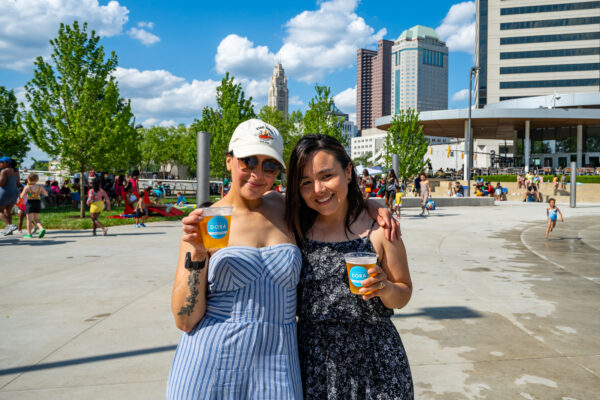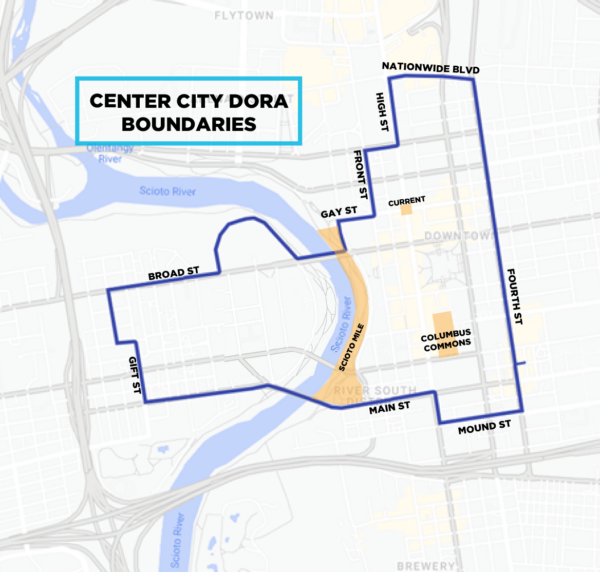Home » Projects & Initiatives » Designated Outdoor Refreshment Area
Hours:
Daily, 11 am – 10 pm
About:
A DORA allows visitors aged 21 and older to consume an alcoholic beverage purchased from a participating business outdoors within the area’s boundaries, during designated hours, and according to DORA rules.
In partnership with the City of Columbus, Capital Crossroads Special Improvement District, and the Franklinton Board of Trade, Downtown Columbus, Inc. led the establishment of a new Designated Outdoor Refreshment Area (DORA) in Downtown Columbus, seamlessly integrating with Franklinton.
We listened to the community during the 2022 Downtown Strategic Plan process, and their desire was clear: they want more – more activity, more shopping and dining experiences, enhanced connectivity within Downtown and to key neighborhoods. A DORA is a powerful tool to help realize the vision outlined by Columbus residents by increasing the vibrancy of the pedestrian experience, the economic impact of Downtown visitors, and the connectivity between Downtown establishments and events.

In the State of Ohio, a Designated Outdoor Refreshment Area, or DORA, is a specified area of land that a local legislative authority (city council or township trustees) has designated as exempt from certain open container provisions as laid out in Ohio Revised Code Section 4301.82. A DORA allows visitors aged 21 and older to consume an alcoholic beverage purchased from a participating business outdoors within the area’s boundaries, during designated hours, and according to DORA rules.
Some special events will be a part of the DORA, while some will not. Participation in the DORA by a special event that takes place within the DORA boundary is at the discretion of the special event permit holder and require approval by the City of Columbus Recreation and Parks Department as well as the DORA managing entity.

You will notice sidewalk stickers and signs around the perimeter of the DORA. Please take note of these boundaries and do not go past the designated perimeter with a DORA beverage.
Participating establishments will display a sticker designating their participation in the DORA. Retailers not selling alcohol may choose to either allow DORA beverages or disallow them, indicated by window signage.

Please note that these responses will evolve as the plan progresses and reflect the most up-to-date information as of July 2024.
A Designated Outdoor Refreshment Area (DORA) is a specified area of land that has exemptions to open container permissions. In Columbus, this designation allows patrons to purchase an alcoholic beverage in a labeled cup to enjoy outside the boundaries of the establishment. Consumption of alcohol not provided in labeled DORA cups is not allowed within the DORA. Patrons may carry their beverage on the public right-of-way, parks, and other places not specifically excluded from the DORA. Patrons are not permitted to carry their beverage from one permitted establishment (restaurant, bar, or alcohol-serving event) into another, nor from one DORA to another DORA.
Boundary signage throughout and along the pedestrian boundaries of the DORA indicate when patrons are exiting the Center City DORA perimeter.
DORA beverages can only be consumed in officially labeled and approved cups within the boundary for that designated outdoor refreshment area.
The Center City DORA and Arena District DORA intentionally do not abut touch one another. Patrons who take DORA cups from one DORA perimeter into another are subject to open container laws.
One key piece of feedback we heard from the community as part of the 2022 Downtown Strategic Plan, was that while Downtown is well established as the place to go for events and festivals, there is a need for more daily, consistent activation. Implementing the DORA is intended to draw people to Downtown any day of the week. We believe the DORA is a complementary amenity to both recurring and one-time events in Downtown and Franklinton.
We also heard that this consistency is crucial to small businesses, who already operate in a more variable market due to the nature of Downtown events. A consistent DORA would help lessen the gap between peak times and slower days.
Lastly, a consistent DORA allows office workers to take full advantage of the Downtown amenity, with the goal to showcase Downtown as a great place to work and entice employees back to their Downtown office, while attracting new companies to locate in the core.
No streets will be closed as part of the regular DORA schedule. However, events that take place within the DORA boundary and choose to activate the DORA may include street closures.
Event organizers can choose whether to have their event included in the DORA or not. If they choose to and are approved by the City to participate in the DORA, event attendees could carry one beverage, in a designated DORA cup, outside of the event perimeter, within the DORA boundary. However, attendees could not carry beverages (even in a DORA cup) into the event perimeter.
By nature, DORA patrons are limited in the amount of alcohol they can purchase at a time. This means that the DORA encourages people to explore the pedestrian environment. For example:
Examining other cities with similarly sized DORAs operating on a fixed schedule, there have been no additional security incidents attributed to the DORA. Both Raleigh, NC and Dayton have outdoor refreshment areas covering extensive areas in their downtowns, with participation from 65+ businesses, and they have reported no security issues since implementing these areas. Additionally, a 2021 survey of 25 DORA communities across Ohio determined that 96% reported no increase in crime as a result of the DORA.
The Center City DORA was approved by Columbus City Council on April 29, 2024. The State approved the DORA on May 23, 2024. It is now in effect. Materials are now being distributed to participating businesses.
If you or anyone you know is in crisis, call the the Suicide and Crisis Lifeline at 988 or the Toll Free Bridge Line below for addiction and mental health services.
877-275-6364 | 614-466-7228 (local)
Downtown Columbus Inc. is a private, non-profit development corporation with a mission to lead city-changing projects in the heart of Ohio’s capital city. Downtown Columbus Inc. was created in 2002 to implement the Downtown Strategic Plan.
© 2024 Downtown Columbus Inc. Check out our Privacy Policy and Terms of Use.

The Scioto Mile Fountain is closed on 7/3, and will re-open on 7/4 for regular hours.